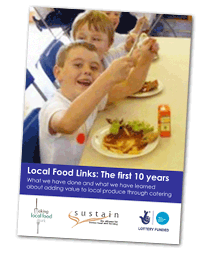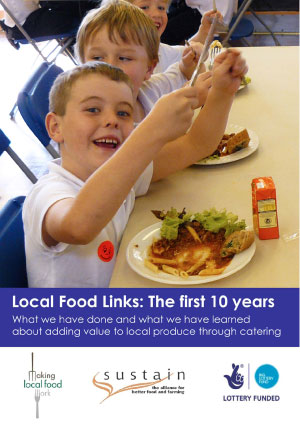Reports • Making Local Food Work
Local Food Links: The first 10 years
 This report reviews the development of Local Food Links, written by Tim Crabtree, its former director and one of the founders of the Bridport Centre for Local Food. The report charts the development of a social enterprise from the trading arm of a charity to an independent organisation focused on providing nutritious school meals made with local food. It explores 'what we have done and what we have learned about adding value to local produce through catering'.
This report reviews the development of Local Food Links, written by Tim Crabtree, its former director and one of the founders of the Bridport Centre for Local Food. The report charts the development of a social enterprise from the trading arm of a charity to an independent organisation focused on providing nutritious school meals made with local food. It explores 'what we have done and what we have learned about adding value to local produce through catering'.
This report is one of a series that analyses opportunities for improving the sustainability and economic viability of food supply chains serving smaller and community-based food enterprises.
Local Food Links Ltd is a Dorset‐based social enterprise which runs a specialist workspace, the Centre for Local Food, provides vocational training and community education, and runs user‐led catering services in partnership with 23 schools and a range of older people's organisations. At time of writing, over 1,000 meals a day were being produced (200,000 a year for schools) and turnover exceeded £500,000 per annum.
This case study of Local Food Links aims to provide information on the development of Local Food Links since its inception in 1999, and in particular how it has developed during the period of funding from the Big Lottery funded Making Local Food Work programme (2007 to 2010). The case study aims to provide sufficient information to explain how Local Food Links has developed and what were the key issues and successes. It explains how Local Food Links has developed the Bridport Centre for Local Food as a community enterprise food hub, with a particular emphasis on adding value to local produce through catering. It also considers issues around how to increas resilience and long-term sustainability, in particular to deal with external shocks from changes in funding, contracts and government policy.
"The Local Food Links case study is part of Sustain’s learning from the Food Distribution and Supply strand of the Making Local Food Work programme, and it is hoped that this can support people who might be thinking of undertaking similar initiatives."
To increase resilience and long-term sustainability, two key things are important:
- The need to diversify operations, in order to create a social enterprise which is more capable of dealing with external shocks and variations in the economic an policy cycle.
- The need to underpin “front‐line” social enterprise activity with secondary structures such as workspaces, IT systems, channels of social investment finance.
Report contents
1. Introduction
2. Background
- West Dorset Food & Land Trust and establishing Local Food Links
- Rationale: building a better food system
- Taking practical action
3. 1999 to 2001: Farmers’ markets and the market café
- Developing a secondary structure: Bridport Centre for Local Food
- Developing a secondary structure: Wessex Reinvestment Trust
4. External shock No. 1
- Collapse of West Dorset Organic Foods and Dorset Local Food Direct
5. 2003 to 2005: The School Fruit Scheme
6. External shock No. 2
- Introduction of the government’s free fruit scheme
7. 2005 to 2006: Pilot hot lunch scheme
8. External shock No. 3
- New rules for school meals, and ready-meals from Nottingham
9. 2006 to 2007: Development of West Dorset School Meals Partnership
10. 2007 to 2008: Restructuring Local Food Links
- Restructuring Local Food Links as an independent social enterprise
- Making Local Food Work: Food Supply & Distribution
- Development of catering services for schools and nurseries
11. External shock no 4
- Financial pressures of running a school meals service
12. 2008 to 2010: Diversifying work through older people organisations
13. Finance
14. Sustainable Local Food Hub
- Phase 1: Feasibility study
- Phase 2: Researching the optimum scale for food hubs
- Phase 3: Integrated catering, growing, energy and waste management
15. Key issues and challenges
- Tensions between social and financial objectives
- Different stakeholder motivations
- Different cultures appropriate at different stages of development
16. Conclusions
17. Useful contacts for information and advice
Published Wednesday 15 June 2011
Making Local Food Work: Making Local Food Work aimed to reconnect people and land through local food by increasing access to fresh, healthy, local food with clear, traceable origins.
